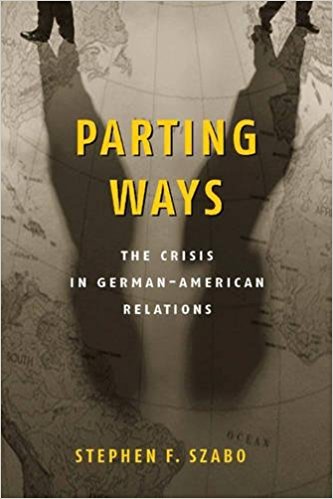Parting Ways Summary
5 min read ⌚
 The Crisis In German-American Relations
The Crisis In German-American Relations
The German-U.S. relationship achieved its lowest point on September 18, 2002, just before German voters cast their polls in the nation’s most challenging race.
Who Should Read “Parting Ways”? And Why?
Stephen F. Szabo presents a balanced take on the circumstances prompting the crack between Washington and Berlin’s relations over Iraq. He depicts how Sept. 11, 2001, was the shotgun in the marriage between U.S. conservatives and neo-conservatives.
Furthermore, Szabo profiles the cultural and historical conditions that contributed to the German observation that Bush is the most prominent risk to world peace. Moreover, his book is a compelling strategic depiction of how an essential, longstanding political relationship can vanish overnight.
We recommend “Parting Ways” to any reader interested in international relations and the Bush Administration.
About Stephen F. Szabo
 Stephen F. Szabo teaches European studies at Johns Hopkins University. He specializes in contemporary German politics, as well as European security and policies. He is the author of The Diplomacy of German Unification, among some other books.
Stephen F. Szabo teaches European studies at Johns Hopkins University. He specializes in contemporary German politics, as well as European security and policies. He is the author of The Diplomacy of German Unification, among some other books.
“Parting Ways Summary”
Herta Däubler-Gmelin, Germany’s minister of justice, looked at George W. Bush’s techniques like those of Hitler. She claimed that Bush had fabricated a crisis in Iraq to divert Americans from domestic financial difficulties.
Germans felt that while the U.S. attack into Afghanistan was necessary, the Iraq attack was a big mistake.
Germans doubted America’s approaches and considered its power as the most significant danger to world order. From America’s point of view, Germany had moved toward becoming a part of “old Europe”.
Age and tradition had distorted Germany’s frame of reference, which no longer presented the commitment to freedom which was grasped by more recently freed countries. Germany started thinking that its safety depended more upon Europe, as opposed to America.
After the attacks on September 11, German Chancellor Schröder proclaimed his administration’s solidarity with the U.S. On September 14, more than a million Germans gathered at Berlin’s Brandenburg Gate to express their sympathy.
Realizing that the al Qaeda group in Hamburg had made the key arrangements for the 9-11 assaults, most Germans understood that terrorism was a critical issue in their nation. Schröder flew to New York to see the pulverization at Ground Zero and after that went to a meeting with President Bush in Washington.
Schröder left trusting that the Americans were more angered than they had been after Pearl Harbor. Back in Germany, he confronted a governing coalition of Greens and Social Democrats who opposed any utilization of power no matter the purposes.
That November, Schröder plotted a vote of confidence for German help of the U.S. affairs in Afghanistan. However, his legislature barely got approval to send 2,500 German troops. This was the culmination of German support for the Bush organization.
The fracture of Bush’s and Schröder’s relationship dates to the President’s visit to Berlin in May 2002. The talks amid the meeting are a matter of dispute. On the one hand, the Bush Administration argues that Schröder vowed support for war against Iraq, if it was quick and fruitful, and occurred after the German elections.
On the other hand, the Chancellor said he and Bush agreed on a few issues. They concurred that Hussein was a homicidal tyrant who must be influenced to allow global arms assessments.
The Germans said Bush showed that he had no final military intend to attack Iraq. Furthermore, Schröder noted that did not promise anything to Bush, and his assistants said that whatever commitments he may have made were conditioned: consultations had to be done before any change in U.S. approach.
After the meeting, Schröder trusted that fundamentally nothing had changed. In any case, as the late spring wore on, Bush turned out to be more aggressive toward Iraq.
Many different issues separate Germany and the U.S., as uncovered by various surveys, and the division between U.S. German approaches and methodologies stays profound. Be that as it may, the pre-2002 connection between the U.S. and Germany is history.
It is essential that new leaders in new conditions forge another one. All things considered, the Bush organization thought little of the significance of Germany’s position.
Germany and France cooperated believing that American power was a more prominent danger to world stability than Saddam Hussein himself. Moreover, Hedge and Schröder both wrongly personalized the diplomatic encounter. To sum up, the crisis taught the world a lesson.
Identities matter when conducting international affairs, yet the over-personalization of foreign policies is rarely not a bad idea. With respect to Schröder, while his oppugnancy to Bush improved his political image at home, he harmed Germany’s role in foreign policy.
Key Lessons from “Parting Ways”
1. Traditional Realism versus Neo-Conservatism
2. The German Security Balance
3. The Death of Trusted Paradigms
Traditional Realism versus Neo-Conservatism
Before George W. Bush, Republicans kept away from worldwide overextension of democratic ideology and power. Europeans, on the other hand, did not mind the traditional approach. Nonetheless, the neoconservatives had confidence in the general appeal of American values.
This is an aspect of the long tradition of American exceptionalism, whose defenders see the U.S. as a power for good that ought to be utilized proactively. They shunned the alert practiced by the conventional pragmatists.
Pearl criticized Europe for a pattern toward passiveness in the war on fear. Such neo-con judgment of the European partners’ ethical integrity gravely damaged a relationship that had been abutting for over 50 years.
The German Security Balance
From Germany’s historical point of view, safety cannot be surveyed autonomously leaving out the need to safeguard human liberties. Germans, like various other Europeans, are used to an abnormally high state of powerlessness and vulnerability.
Hence, they tend to underestimate the instinctive American response to the nation’s lost sense of immunity.
The Death of Trusted Paradigms
Regardless of the possibility that the Bush organization had continued with a multinational way to deal with Iraq, the social partition amongst Washington and Berlin would have most likely extended progressively. The German and U.S. cultures have been veering in vital ways.
Following the German reunification, Germany can get by without its security attached to the U.S.
Moreover, German and American leaders’ opinions regarding the risk of terrorism, its source and what ought to be done about it, differ significantly.
Like this summary? We’d Like to invite you to download our free 12 min app, for more amazing summaries and audiobooks.
“Parting Ways” Quotes
Germans now regard the United States as a power like any other great power, interested primarily in expanding its power. It has lost much of its moral authority and its credibility. Share on X One of the most striking and disturbing lessons of the run-up to the war in Iraq was that even a relationship built on 50 years of close cooperation, extensive personal networks and solid economic interests could deteriorate sharply in a… Share on X The damage was deeper in Washington than in Berlin, largely because of George W. Bush's highly personalized approach to foreign policy. Share on X No international or transnational body has yet emerged as an alternative to it. Therefore the United States,...has taken on the role of architect and enforcer of a new system. In doing so, it has also become the target for groups...that… Share on X Schröder does not appear to have strong emotions. He once told a journalist that personal relationships with other leading politicians are helpful but are not the a precondition for successful foreign policies. Share on XEmir is the Head of Marketing at 12min. In his spare time, he loves to meditate and play soccer.


 The Crisis In German-American Relations
The Crisis In German-American Relations




